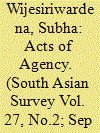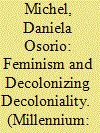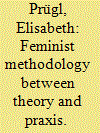| Srl | Item |
| 1 |
ID:
174930


|
|
|
|
|
| Summary/Abstract |
In Sri Lanka, abortion continues to be a criminal offence under the Penal Code of 1883. Several attempts have been made to challenge the colonial-era law since the 1990s with no success thus far. This study documents and centres the knowledge of women and transpersons in accessing abortion and sexual health and reproductive health services in Sri Lanka in order to contribute to the conversation on abortion law reform as well as research and advocacy. Our data suggest that the existing legal reforms proposed to the abortion law would be unresponsive to the needs of women and transpersons in Sri Lanka, and that in additional to legal changes, we would need significant social and cultural changes. This study uses feminist research methodologies, building towards a feminist ethics in abortion research.
|
|
|
|
|
|
|
|
|
|
|
|
|
|
|
|
| 2 |
ID:
192190


|
|
|
|
|
| Summary/Abstract |
This article demonstrates the import of feminist reflexivity for the decolonial project. At its best, the decolonial project reveals the form and extent to which contemporary ideas and power structures are imbued with generations of power structures whose foundations were laid during colonialism. However, some power dynamics can be lost in reified forms of decolonial critique. Feminist methodologies, especially reflexivity, remind us to revisit the particulars of the constructions of power within dominant power structures and, as importantly, within resistant power structures. We revisit the decolonial stance within an Indigenous cosmology, Aymaridad, ‘the’ Aymara worldview as constructed for the second largest Indigenous population in Bolivia. Aymaridad is an important site for feminists to revisit the relationship between feminism and decoloniality because over a decade ago, María Lugones charted a course for decolonial feminism that drew on an Aymaran approach to decolonizing gender. By revisiting the coloniality embedded in the construction of Aymara (in academe and in politics), we reveal that feminism’s persistent reflexive methodology, even more than its attention to gender specifically, makes it an essential part of the decolonial theory.
|
|
|
|
|
|
|
|
|
|
|
|
|
|
|
|
| 3 |
ID:
173396


|
|
|
|
|
| Summary/Abstract |
The article revisits the problematic relationship between feminist theory and praxis through the writings of Marysia Zalewski, one of the foremost feminist theorists of IR. Zalewski has dealt with this relationship through her work on methodology. In three sections, the article explores: (a) her engagement with standpoint theory through her interventions in feminist IR debates with ‘the mainstream’; (b) her adoption of feminist postmodernism, embracing a deconstructive posture and in particular the notion of ‘hauntings’ as a methodological device; and (c) the development of a distinctive methodological attitude that seeks to involve, rather than explain or instruct. Crucially, for Zalewski, theory and praxis/politics cannot be separated methodologically: languages of mastery and an attitude of ‘doing something’ are of one cloth. The paper ends with a reflection about how L. H. M. Ling's method of ‘chatting’ could be enacted in engagements that cross the social fields of academia and policy.
|
|
|
|
|
|
|
|
|
|
|
|
|
|
|
|